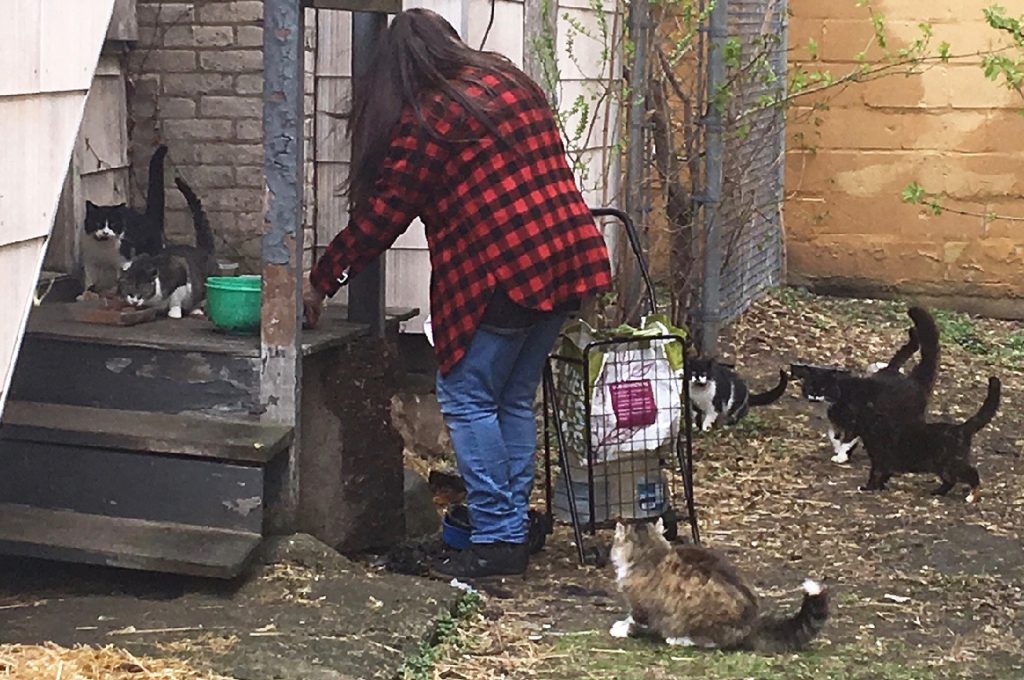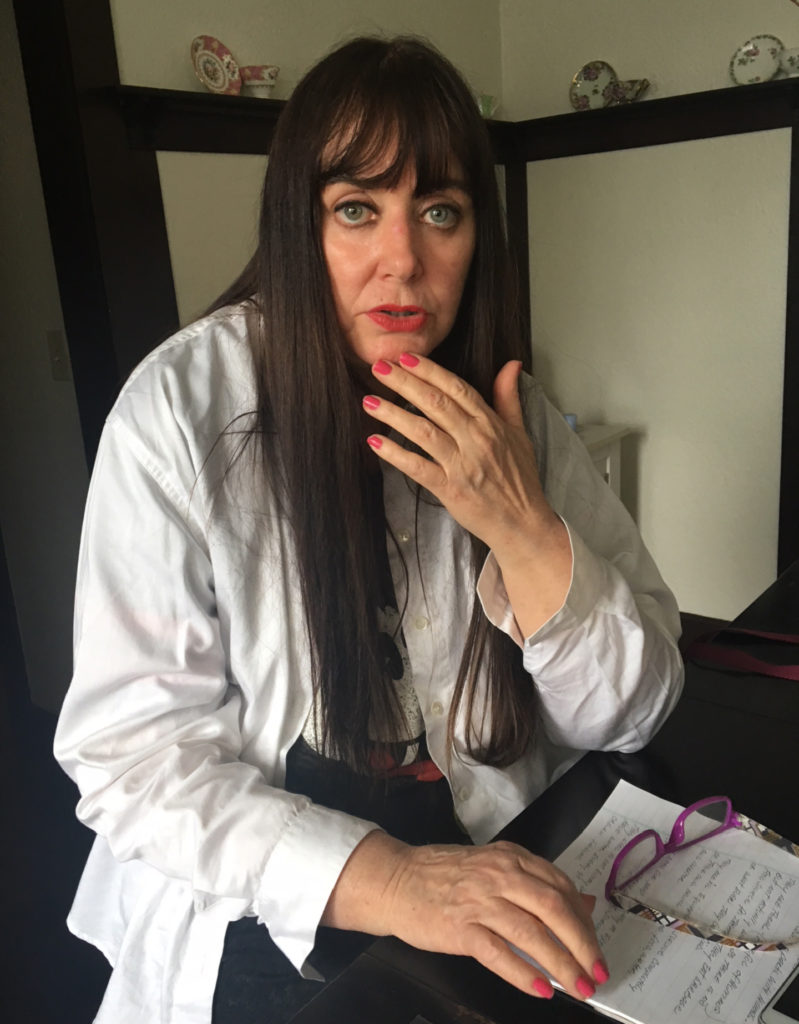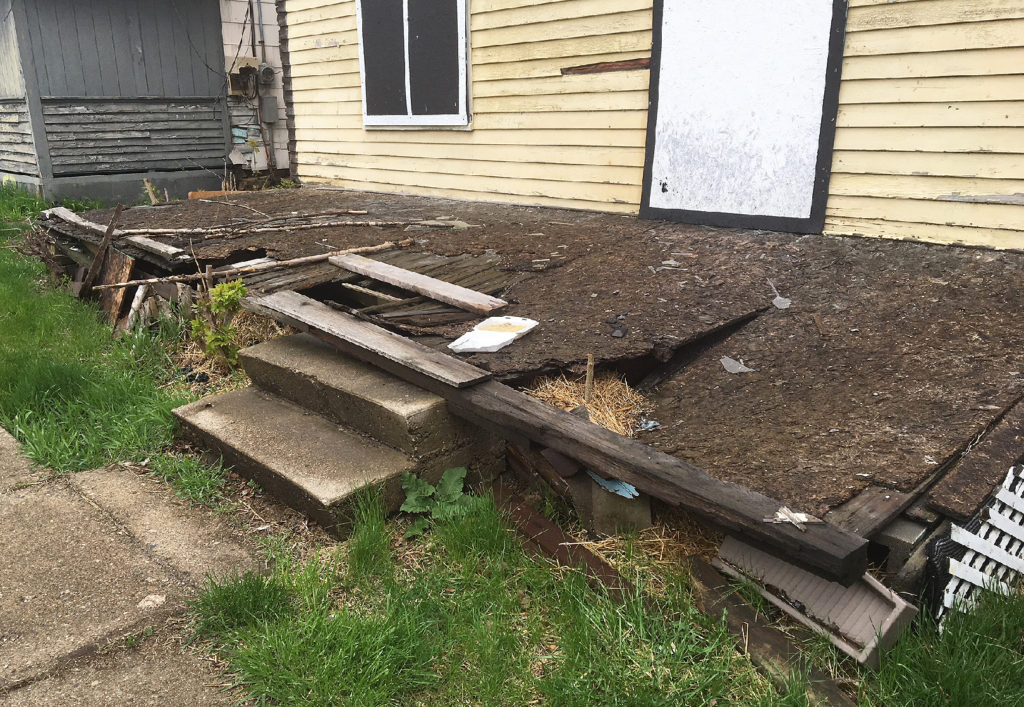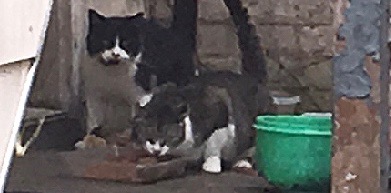By Patsy Isenberg
A group of 20 or more feline squatters in Carriage Town–including Snowflake, Princess, Butterfly, Stripe, Watermelon and Friendly–are luckier than most feral cats.
That’s because of a kind-hearted woman who lives nearby. Sonny Rabanal has taken on the task of feeding what she calls the Lyon Street cats. She started feeding strays sheltering in abandoned buildings several years ago, and has hardly missed a day since.
When the cats see Rabanal coming, they quietly slink out from wherever they’re hiding and patiently wait as she loads food onto several makeshift feeding dishes she leaves around for them.
She loads up dishes with dry food every day and spoons out wet food every other day. She also supplies bowls of filtered water.
“They need to eat every day and must have water every 48 hours or they will have organ failure,” she said.

Rabanal’s charges gather round when she arrives with food and water (Photo by Patsy Isenberg)
By now, Rabanal has named most of the cats and gets worried when any she expects to see on her rounds don’t show up. Eventually, Stripe, Butterfly, Lucy, and Castiel let her touch and pet them a little.
Rabanal says she is pretty sure most of the Lyon Street cats have been neutered through the TNR (Trap Neuter Return) program, run by Bonita Flowery.
Flowery has been using a local non-profit animal clinic, All About Animals, for neutering, and has accumulated several cages and become quite skilled at catching the critters.
Rabanal first met Flowery when she saw her in the neighborhood with cages. They teamed up to neuter as many Lyon Street cats as they could. Rabanal said they have neutered about 22.
While the clinic has the cats, they also perform wellness exams and administer vaccinations.
Rabanal, originally from Flint, lived in Miami for many years with her former husband.
She moved back in 2011, and lives with her own cat, Bella, in an apartment in her sister’s house. Rabanal’s family owns several of the houses in her neighborhood, properties inherited from a relative who died several years ago. She worked at South Miami Hospital as a patient financial representative. Like many Flint residents, she hasn’t found a job here so far.

Sonny Rabanal (Photo by Patsy Isenberg)
The funny thing is that Rabanal claims to be more of a “dog person” than a “cat person.” But several years ago, she rescued her cat, Bella, who is allowed to go outside but doesn’t go on the rounds with her.
One Lyon Street cat, Watermelon, comes into her yard and plays with Bella now and then. None of the ones she feeds come into her home–Rabanal says feral cats would never want that, anyway.
The way Rabanal sees it, the cats are there in the neighborhood and she “can’t stand the thought of an animal starving or freezing to death.
“Feral cats live a difficult life on the streets, a harder, shorter life than their counterparts with homes,” she says. She has a soft heart for other city creatures, too. On the cart that holds the cat food and water, she also carries seeds for squirrels and crackers for the birds, which she scatters on the sidewalk.
Some of the Lyon Street cats are strays, abandoned, or lost pets. Most, however. are feral. Feral cats are not dangerous and don’t approach people. If a feral kitten is rescued, it’s possible to domesticate it for a pet, but the window of time for doing that is very short.
The best way to handle the growing number of stray and feral cats is through a TNR program, Rabanal says. People like Rabanal, Flowery and the organizations that provide TNR programs are much needed.
A female cat can become pregnant as young as five months old and can reproduce two to three times a year, resulting in 15 or so kittens a year per cat and up to 180 offspring in her lifetime.
Many people hold on to the belief that colonies of cats are dangerous or destructive. She vigorously contends they aren’t–they are just trying to exist.
According to alleycat.org, “While catch and kill advocates cling to outdated thinking and hyped-up stories, the people studying, teaching, and defending public health recognize that feral cats do not spread disease to people. Policies based on fear, hype, and hysteria serve neither the public nor the cats, and will only end in more cats being killed.”
At one time, when Rabanal noticed some of the cats had unusual drainage around their eyes, she consulted Flowery, and they obtained some antibiotics to mix in with the wet food.
Rabanal and her sister also got bales of straw last year before the cold weather set in and placed it under the porches of some of the vacant houses.

Rabanal and her sister put straw under the porch of one of the houses where the cats take shelter (Photo by Patsy Isenberg)
Two of the three houses where the cats gather are owned by the Genesee County Land Bank and the third one is owned by someone else, but all three are in poor condition and have had no improvements or tenants since her feeding venture began.
But someone keeps interfering with the straw areas and has even made weak and slipshod attempts at nailing boards up and messing up the straw to prevent the cats from going under the porches. She is frustrated over the tearing down of the shelters she tries to maintain for her “innocent animals.”
Rabanal placed signs on the properties asking for cooperation, but the signs were even torn down.
“If they don’t want to help, then don’t hinder those willing to do the humane thing,” she says. She got yelled at by a neighbor when returning some neutered cats to their original location. She sent the neighbor a letter explaining what she was doing and hope they now understand she was just returning animals that had been neutered.
Neutering is the best deterrent to the cat overpopulation, but it takes a while to start making a difference, Rabanal says.

Close up of two Lyon Street cats (Photo by Patsy Isenberg)
All About Animals has launched a program to help anyone who wants to create a TNR program for the cats in their neighborhoods. EVM wrote about the organization during coverage of a CCNA meeting earlier this year. At that meeting, Angela Roth, from All About Animals, explained the whole process, the cost, and where the organization opened their Flint clinic last October.
Flowery mentioned another way that can help a little. Farmers sometimes express interest in obtaining cats to live in their barns as mousers. But she said they usually only want two or three and someone has to get them into cages and deliver them to the farms, which can sometimes be quite a distance.
A few cat sanctuaries have sprung up around the country, but feral cats actually just want to be left alone. The TNR program and a little kindness and tolerance are the best solutions, Rabanal says.
Meanwhile, the cats have to live somewhere. Sometimes people just drop off cats — or whole litters of kittens they don’t want to deal with — in the neighborhoods, Rabanal says. They fool themselves into thinking the cats will be taken in or taken care of, and the problem grows, especially if they aren’t neutered.
Luckily, the Lyon Street cats — Stripe, Butterfly, Lucy, Castiel, Tracker, Panther, Midnight, Spot, Kally, Dean, Scrappy, Shadow, Lacey, Snowflake, Watermelon, Princess, Grey Ghost, Chloe, and Friendly — count on Rabanal to feed them daily.
Many more count on Flowery and others to implement successful TNR programs. But more help is needed. It costs a minimum of $25 a week for Rabanal to feed the Lyon Street cats. There’s also the cost of the filtered water and the straw she provides.
She does get donations of food or money occasionally and her sister provided the straw last year, but so far she can’t rely on it. Rabanal says she also could use some back-up help once in a while. It’s a big responsibility.
Fundraiser Wednesday, May 22
Flowery has a non-profit organization of her own called WAG Animal Outreach, in Fenton. She’s holding a fundraiser featuring entertainment by comedian/ventriloquist Brian Bosman from 7 to 10 p.m. Wednesday, May 22 at a bar in Fenton, The Fireplace. Tickets are $20 in advance and $25 at the door.
To get tickets for the May 22 fundraiser at The Fireplace in Fenton or to find out about WAG Animal Outreach, email Bonita Flowery at saveananimal@yahoo.com. Sonny Rabanal can be reached at ultravioletttt@aol.com or pisenber@gmail.com for questions, donations or offers to help. Call All About Animals at 586-879-1745 or visit their website at http://www.allaboutanimalsrescue.org.
EVM Staff Writer Patsy Isenberg, herself a Carriage Town resident, can be reached at pisenber@gmail.com.


You must be logged in to post a comment.